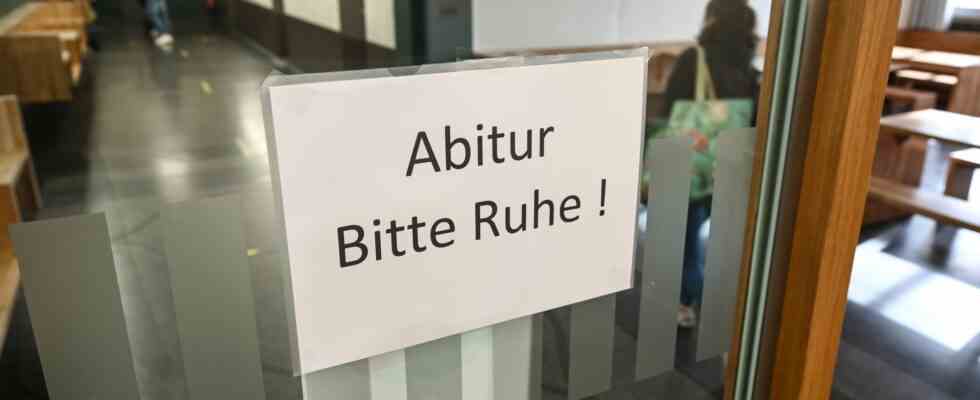Status: 03/16/2023 10:41 a.m
More courses in Brandenburg than in Berlin: Education is a matter for the federal states and so the way to the Abitur is different. The rules have long since become more uniform. Today the Ministers of Education are advising.
In the advanced math course at the elementary and comprehensive school in Lehnin in Brandenburg, they are currently studying calculus. The teacher draws graphs on the whiteboard. The students listen carefully and take notes, including Luca Wessels. His performance in the advanced math course is important for his high school grades.
In order to understand how the Abitur grade is composed, you almost need a separate advanced course: In addition to the math results and the final exams, the achievements from another advanced course are included. There are also eight subjects that are taught in the basic course. The student has ten subjects spread over four semesters. Since there are evaluations every six months, he ends up with 40 evaluations that flow into the Abi, of which he can still delete the two worst.
Unified Abitur may come from 2025
Robert Holm, RBB, Morgenmagazin, March 16, 2023
Different number of courses
This is how the Abitur grade in Brandenburg comes about from 38 assessments and the exams. And that’s different in every state. In Berlin, for example, only 32 ratings are included. “I think that’s kind of unfair,” says the 12th grader. Especially when it comes to the allocation of study places.
When Luca Wessels finishes school, he wants to apply to a university in Lower Saxony. Then he is in competition with high school graduates from other federal states who have completed a different degree and whose grades are still compared with his.
Judgment from Karlsruhe in 2017
This injustice in Germany’s federal education system is not new. The federal states should make the Abitur more uniform – that was the decision of the Federal Constitutional Court in 2017 and called on politicians to take action.
And the Conference of Ministers of Education wants to do that now – after six years. From a paper that dem rbb is available, the first cornerstones emerge. In the future, the students should therefore take a total of 40 courses in the four semesters of the upper secondary school, of which 36 ultimately flow into the Abitur grade.
Different echo
The German Association of Philologists welcomes this: “The course evaluations to be included make up two-thirds of the Abitur mark,” says Susanne Lin-Klitzing, the association’s chairwoman. “Whereas the Abitur examination only makes up one third. That’s why it’s wise to ensure greater comparability in the course contributions for the two-thirds area.”
The Education and Science Union (GEW), on the other hand, sees the plans of the Conference of Ministers of Education critically. According to GEW board member Anja Bensinger-Stolze, better comparability is at the expense of flexibility in the design of the Abitur. She rejects further regulations from above: “Actually, we have to go in a direction that allows more flexibility for the Abitur instead of less. If only because we have a heterogeneous student body, because the requirements of the working world are changing and because we have to take digital change into account. It is therefore not good if we limit the innovative scope of the Abitur.”
Away from educational federalism
Luca Wessels and his classmates are mostly in favor of standardization. They say this would lead to more equal opportunities when looking for university places. Her teacher in the advanced math course, Dirk Lenius, also sees it this way: “We currently have very different regulations in the countries. And I think every step away from this federalism in the education system is a good step.”

